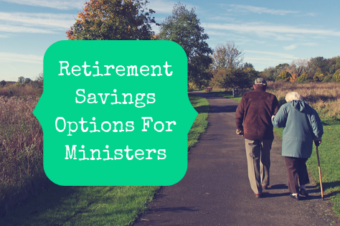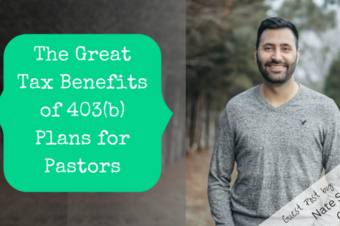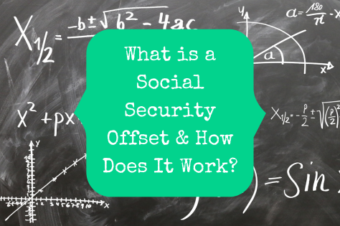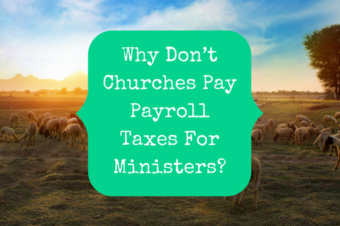This is a guest post by Nate Skelly, CERTIFIED FINANCIAL PLANNER™ professional and founder of Financial Pathway. He is passionate about providing financial education from a biblical worldview. Nate lives in the Tampa, FL, area with his wife, Charity, and their three kids: Jaden, Judah, and Juliet.
You know what they say about things that sound too good to be… they usually are! But let me assure you, if you’re a licensed, ordained, or commissioned minister, this article is worth 10 minutes of your time!
The bottom line is this: if you are a pastor and you are not contributing to a church-sponsored 403(b) you are likely missing out on thousands in tax savings over the coming years.
Understanding the Church-Sponsored 403(b) Plan
A 403(b) plan is similar to a 401(k), but it is only available for nonprofits.
One key advantage is that church-sponsored 403(b) plans don’t have to follow the fairness rules that apply to 401(k) plans. These rules are meant to ensure retirement plans don’t favor higher-paid employees too much, but they can create a lot of extra paperwork and restrictions. Since churches are exempt from these rules, they have more freedom to design a retirement plan that works best for their staff, without worrying about complicated tests or limits. Additionally, 403(b) plans tend to be a lot easier to set up and manage on an ongoing basis.
Image source: Mint/Intuit
The Housing Allowance Advantage
Licensed, ordained, or commissioned ministers can designate a portion of their income as a housing allowance. This allowance, up to certain limits, is not subject to federal income tax.
For example, if a pastor earns $60,000 per year and his church designates $20,000 as housing allowance, only the remaining $40,000 is subject to income tax. Not only does it lower the pastor’s overall tax bill, it also makes him more likely to qualify for certain income-based benefits.
By the way, if you are not already utilizing your housing allowance or unsure if you are able to, speak to your church and your tax professional right away!
But it gets better…
Housing Allowance in Retirement
Most pastors don’t know that housing allowance can extend beyond their employment years. Even in retirement, pastors can still claim housing allowance on withdrawals from their church-sponsored retirement accounts. This is a huge benefit!
For example, let’s say a pastor’s housing allowance retires and his church designates his housing allowance amount at $24,000/yr. This means that for his first year of retirement, he would be able to claim up to $24,000 of withdrawals from his church-sponsored 403(b) account as housing allowance and pay no income taxes (or Social Security and Medicare taxes) on those withdrawals. Even though he is no longer being paid by the church, he is withdrawing funds that were set aside in a church-sponsored retirement plan so he is still able to claim housing allowance on those funds.
Keep in mind that any withdrawals above the housing allowance amount would be subject to ordinary income taxes.
Making the Most of the Tax Benefits
It’s important to note that the tax benefits only apply to church-sponsored retirement accounts. If pastors have funds in IRAs or 401(k)s from previous secular jobs, a pastor is not able to claim housing allowance on those withdrawals. However, if a pastor made contributions to an IRA with money earned from his religious duties, he can transfer those IRA funds into a church-sponsored 403(b) account and gain the ability to claim housing allowance on those funds during retirement!
Triple Tax Advantage
By utilizing the housing allowance provision and contributing to a church-sponsored 403(b) plan, pastors can potentially achieve triple tax advantage: 1. contributions are income tax deductible 2. the growth of the funds inside the 403(b) is tax-deferred 3. withdrawals can be tax-free if designated as housing allowance within the allowed limits. So it is possible for a pastor to not pay any income taxes on his retirement savings at all!
This makes the church-sponsored 403(b) an even better vehicle than a regular IRA or even a Roth IRA.
Additional Tax Benefits
Contributions made by pastors to their 403(b) accounts also come with another perk. They are exempt from paying Social Security and Medicare taxes on those contributions. Considering that pastors are classified as self-employed and responsible for both the employer and employee portions of these taxes, this exemption can lead to significant savings.
Hypothetical example: a pastor is in the 22% income tax bracket and pays 15.3% Social Security/Medicare tax on his income.
If he contributes $5,000 to his 403(b) account he is saving 37.3% ($1,865) in taxes!
Hypothetical example based on a pastor in the 22% income tax bracket.
Contribution Limits
The contribution limits for church-sponsored 403(b) plans are higher than those for traditional IRAs or Roth IRAs. As of 2025, pastors can contribute up to $23,000 per year from their paychecks. Additionally, churches have the option to contribute to the pastor’s account as well. For 2025, the combined limit of employee and employer contributions is $70,000/yr!
Image source: thecollegeinvestor.com
On top of that, if you are age 50-59 or 64 or older, you can contribute an additional $7,500/year as a catch up contribution raising your individual limit to $31,000. Important note: beginning this year, if you are age 60-63 you can do an even higher catch up contribution of $11,250 raising your individual limit to $34,750.
While most pastors and churches will not come anywhere close to the yearly contribution limit it can be very useful in certain situations.
For instance, let’s say a pastor is getting ready to retire soon. He may want to increase his 403(b) contributions to “front load” his retirement and build up more tax-free income for later on.
Perhaps a church wants to give a substantial gift to a pastor in honor of an anniversary, or maybe it wants to give a lump sum ahead of retirement. Instead of cutting a check directly to the pastor (which would then be immediately taxable), the church may choose to contribute to his 403(b) plan instead and help the pastor save substantially on taxes.
Conclusion
The special tax provision for pastors through church-sponsored 403(b) plans offers unparalleled benefits. By maximizing the housing allowance provision and taking advantage of the triple tax advantage, pastors can save a significant amount on taxes and enjoy tax-free withdrawals in retirement.
If you have questions about setting up a 403(b) plan for your church, you can schedule a quick phone call with Nate here.
Important reminder: always consult with your tax professional when considering any of these steps. This is not tax advice, but rather areas of potential tax savings that you should be aware of.



















